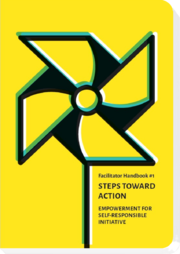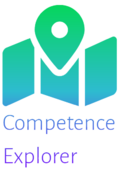Goal
Organizations and facilitators understand how their mission, purpose and learning activities relate to key competences. They gain information on how they already include competency orientation in their activities. They get an insight about the potential of competence orientation for their activities.
Competence Explorer
- Our tool for an overview of different competence frameworks: Competence Explorer
- Browse the competence models and their definitions
- Learn which of these are relevant to your work
Steps
Connecting to your social purpose
Ask in four smaller groups or in a moderated plenary setting what your mission or purpose is.
- Why are you important for the society?
- What are your internal drivers?
- Inspiration: Task: Start with "Why"
Write down or notice your findings.
Introduction of Key Competences
Key Competences are abilities, understood as the whole set of knowledge, attitudes and skills, which are useful for individuals in a lot of different situations and social contexts. Therefore, we look on our activities from two perspectives:
- the learner, participant or visitor: What gain of knowledge skills and attitudes could this person expect thanks to your activities?
- the different social sectors: What competences are very important and relevant in these social contexts;
- 1. economical wellbeing,
- 2. cultural expressing,
- 3. social engagement and
- 4. personal/personality development?
Sector Groups
Divide the group in four groups or keep the four groups from the beginning. Give every goup one of the following questions:
- What competences can a learner/participant/visitor take out for personality/personal development?
- What competences can an employee gain in your activities for economic wellbeing?
- What competences for their cultural expression could learners/visitors/participants gain in our activities?
- What competences for involvement in social groups and public discussions and decisionmaking processes can a citizen gain in our activities?
Take care, that participants take the perspective of their learners/participants/visitors:
- "As a visitor/participant/learner I'd gain this competence:..."
Collection in a plenary setting
Invite each group to present their relevant competences. The facilitator notes them on cards, one card for one competence.
Cluster the competences on cards of the same color - economy white, culture blue, individual development yellow, engagement red...
Put the clustered cards on a table or on the floor.
Clustering
After the last group finished their presentation it's time to look on similarities. We could imagine that the following categories are helpful for orientation:
- personality development/personal competencies
- civil engagement
- team and group cooperation
- communication/understanding
- specific knowledge
- specific methodology
...and others that are important in your context
Reflection
The more colorful mixed the clusters are, the more this indicates that your work addresses many transversal competences.
- What is suprising?
- What is confirming you in your self-perception and prior analysis?
- What aspects need further exploration?
Reality check:
- Is adequately communicated what people learn here?
- For what kind of new learners, visitors, participants could we become attractive?
Variation
After this collection and clustering a more precise step might follow. Analyse the clusters by using the key competence model. Distinguish between knowledge, methodological skills, social and personal skills:
The task can also be a starting point for a concise description of learners' competence development, in example for certificates:
Nils-Eyk Zimmermann
Editor of Competendo. He writes and works on the topics: active citizenship, civil society, digital transformation, non-formal and lifelong learning, capacity building. Coordinator of European projects, in example DIGIT-AL Digital Transformation in Adult Learning for Active Citizenship, DARE network.
Blogs here: Blog: Civil Resilience.
Email: nils.zimmermann@dare-network.eu
Experience
This task can help organizations and projects to learn how people learn in and through their organisations and, in consequence, to adapt their curricula and programs to the needs of learners.






